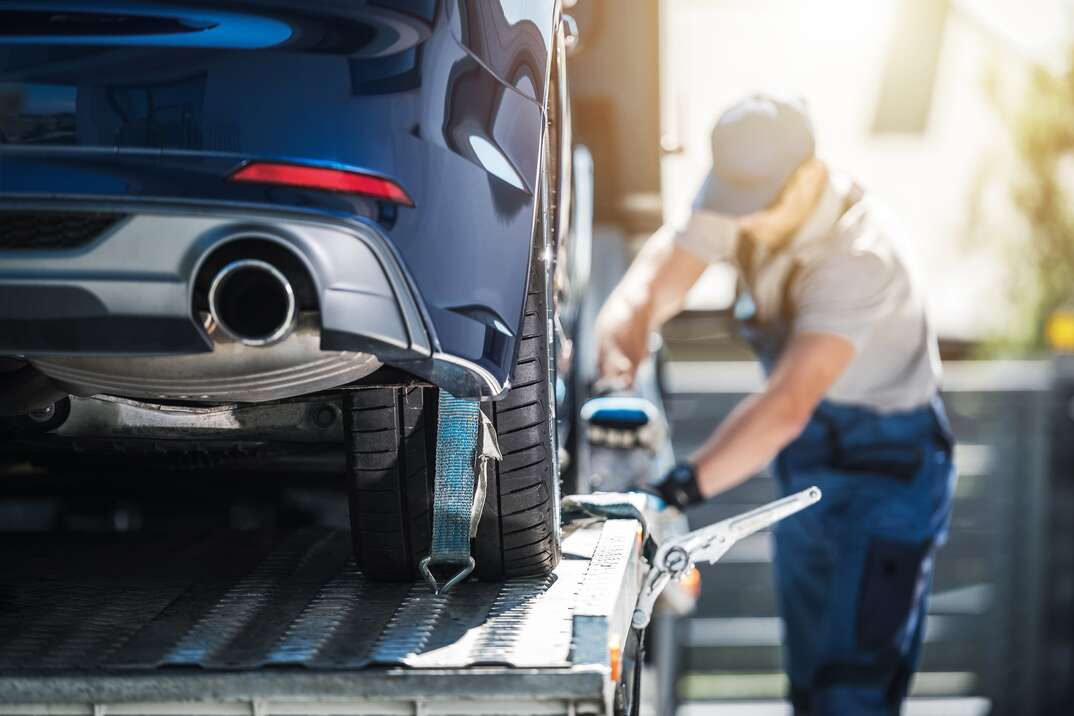- AppliancesElectriciansHVACLandscapingLocksmithPest ControlPlumbingRenovationRoofingT V RepairAll Home Improvement
- Car AccidentClass ActionCorporate LawCriminal DefenseDivorce LawEmployment LawFamily LawFinancial LawLegal AidMedical Injury LawyersMedical MalpracticeReal Estate LawWater Fire RestorationAll Legal
- InvestmentRetirementAll Finance
- Animal InsuranceAutoGeneral InsuranceHealth PolicyHome RentersAll Insurance
- DentalHealth SpecialistsAll Medical
- Animal CareVeterinaryAll Pets
- Auto GlassTowingAll Automotive
Your Legal Rights During a Car Repo: Understanding Repossession Laws

Reviewed by Carina Jenkins, J.D.
As of 2023, the average cost of a new car is approaching $50,000. Unless you're the world's best saver, you probably can't afford to pay cash for a vehicle. Fortunately, many banks and financing companies offer auto loans with favorable terms.
Just make sure you can afford to make your monthly payments. Otherwise, the lender may initiate repossession proceedings.
Repossession is a legal process that allows a lender to take your vehicle without suing you or giving you prior notice. An auto loan is a secured debt, which means the vehicle you buy acts as collateral for the loan.
Collateral is just a fancy term for an asset a lender can seize from you if you fail to make your payments as agreed. Since your vehicle serves as collateral, your lender is allowed to seize it, sell it and use the proceeds from the sale to cover the balance of your loan.
Why Are Cars Repossessed?
Lenders repossess vehicles when borrowers default on their loans. Although many lenders wait for several months to begin the process, others file as soon as you miss a payment. What your lender does depends on their internal policies and the laws in your state.
In an involuntary repossession, the lender sends a repo agent to seize the vehicle. If your state doesn't require lenders to provide advance notice, you may wake up one morning to find your car or truck isn't where you parked it the night before. Repo agents use many tools to help them find your vehicle and repossess it. For example, an agent may use social media to determine where you work or where you like to have dinner on Saturday nights.
Some lenders notify you of a pending repossession even if the law doesn't require it. If your lender is one of them, you may be able to negotiate a voluntary repossession. This is when you surrender the vehicle instead of waiting for a repo agent to find it and take it from you. If you negotiate a voluntary repo, you may save money on repossession fees.
If you don't surrender your vehicle, here's how involuntary repossession works:
1. A repo agent seizes the vehicle.
2. The lender keeps the vehicle or sells it at a public auction. You may have the opportunity to buy it back before this happens.
3. You pay the remaining balance, if applicable. In some cases, the lender doesn't get enough money to cover the balance of your loan. For example, if you owe $8,000 and the lender only gets $7,000, you'll end up with a deficiency balance of $1,000. Depending on where you live, the lender may sue you to recover this amount.
More Related Articles:
- When Do You Need a Lawyer? Determine If You Need to Hire an Attorney
- What Is a Class-Action Lawsuit?
- What Is a Misdemeanor?
- What to Do After a Car Accident
- What Is Power of Attorney?
What Are Your Rights If Your Car Is Repossessed?
Repossession is a legal remedy, so you do have certain rights. Lenders and repo companies must respect these rights during every stage of the process. One of those rights relates to the personal items in your vehicle.
For example, if there's a guitar, a textbook and some clothing in the vehicle when a repo agent seizes it, the lender can't sell the items until a certain amount of time has passed. The length of the waiting period depends on where you live, as each state has its own laws governing the repossession process.
Your lender may also be required to cut you a check if they earn more on the sale of your vehicle than you owe on the loan. For example, if the lender gets $12,000 to cover a $9,000 debt, they may be required to give you the $3,000 overage. Again, every state has different laws, so it's wise to speak with a licensed attorney in your area to determine what rights you have before, during and after a car repo. Your state's Attorney General or Consumer Protection Department may also be able to provide information about your rights.
Finally, repo agents aren't permitted to "breach the peace" when seizing a vehicle. What constitutes a breach of the peace varies based on state law. In some states, the agent isn't allowed to go into a closed garage and remove the vehicle. Other states prohibit repo agents from using threats of force. If you think a repo agent violated the law, contact an experienced attorney for assistance.
Elocal Editorial Content is for educational and entertainment purposes only. The information provided on this site is not legal advice, and no attorney-client or confidential relationship is formed by use of the Editorial Content. We are not a law firm or a substitute for an attorney or law firm. We cannot provide advice, explanation, opinion, or recommendation about possible legal rights, remedies, defenses, options or strategies. The opinions, beliefs and viewpoints expressed by the eLocal Editorial Team and other third-party content providers do not necessarily reflect the opinions, beliefs and viewpoints of eLocal or its affiliate companies. Use of the Blog is subject to the
Website Terms and Conditions.The eLocal Editorial Team operates independently of eLocal USA's marketing and sales decisions.



